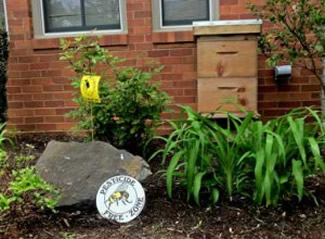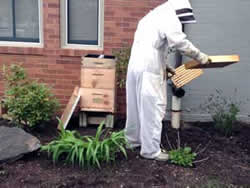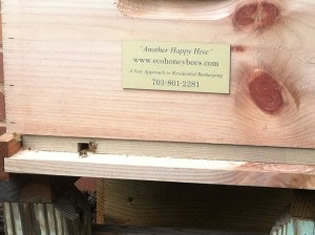BEE Protective Beyond Pesticides Installs Honey Bee Hive at DC Headquarters
 Beyond Pesticides is thrilled to announce that it’s amplifying its own footprint in the BEE Protective campaign by installing an urban honey bee hive at its national headquarters in southeast Washington, D.C.! Beyond Pesticides and our BEE Protective partner Center for Food Safety hope to inspire others across the country to take up the BEE Protective cause and make a safe space for pollinators in their backyards and communities. In addition to educating the public on honey bee health and producing delicious honey at the end of the season, the BEE Protective honey bee hive will provide our neighbors with a valuable service — in the form of bigger and more abundant fruits and veggies!
Beyond Pesticides is thrilled to announce that it’s amplifying its own footprint in the BEE Protective campaign by installing an urban honey bee hive at its national headquarters in southeast Washington, D.C.! Beyond Pesticides and our BEE Protective partner Center for Food Safety hope to inspire others across the country to take up the BEE Protective cause and make a safe space for pollinators in their backyards and communities. In addition to educating the public on honey bee health and producing delicious honey at the end of the season, the BEE Protective honey bee hive will provide our neighbors with a valuable service — in the form of bigger and more abundant fruits and veggies!
Join the BEE Protective Campaign!
Already have your own honey bee hive or pollinator friendly landscape? Maybe you got your workplace to plant pollinator attractive habitat? Let us know! Take the pledge and sign the Pesticide-Free Zone Declaration for Lawns, Landscapes and Pollinators! So far, supporters have notified Beyond Pesticides of over 8,500 acres of pollinator friendly landscaping. But we know there’s more out there! Help us reach our goal of 10,000 pollinator friendly acres, and send a message to chemical companies and federal regulators that honey bee health matters to you by creating a pesticide-free refuge for pollinators!
| **Bee Wary of Flowers and other Garden Plants from Big Box Retailers and other Nurseries: Despite your best intentions to grow a pollinator-friendly landscape, big retailers and nurseries could be putting your neighborhood pollinators at big risk. A recent study found that many national retailers sold garden plants that were treated with harmful neonicotinoid insecticides implicated in the global honey bee decline. Work around this disturbing situation by growing your own plants from certified organic seed, and purchasing certified organic plant starts. Use Beyond Pesticides' Pollinator Friendly Seed and Nursery Directory to find safe, organic sources. |
Need some help to get started?
Beyond Pesticides has the resources you need to become an integral part of the BEE Protective campaign. With the BEE Protective Habitat Guide, you can discover the flowers that pollinators love in your area! The guide is separated by season and region, so it’s helpful year-round, wherever you’re trying to establish bee-friendly gardens - be it your own backyard , workplace, school or communal space. There are also additional resources to encourage pollinators beyond your home and garden – on roadsides and rights-of-way, forestland, prairies, meadows, and even on farms through organic practices.
Want to Follow Our Lead and  Become a Beekeeper?
Become a Beekeeper?
Whether you’re in a densely packed city, suburban lot, or out in the country, you can make a huge impact on honey bee health by becoming a beekeeper. Beyond Pesticides has beekeeping resources for each region of the U.S., so you can reach out to experienced ‘beeks’ for training and mentorship. Our fact sheet on Backyard Beekeeping provides a good overview if you want a bit more information on what to expect, and important points to think about when planning out your honey bees’ new home. There’s also a great how-to on constructing your own Bee House for other bee species, if you determine that honey bees just aren’t the bees for you right now.
As bee health continues to suffer after another harsh winter, in addition to providing pollinators with a safe  haven in our yards and neighborhoods, we must also work toward permanent changes that decrease the stress on honey bees and other pollinators. The science has become increasingly clear that pesticides, both alone and in combination with other chemicals, are significant contributors to global pollinator decline. Despite industry attempts to spin the pollinator crisis into “anything but the pesticides,” the fact remains that neonicotinoid pesticides are an important stressor that we can and should address, as Europe already has. While action should come from federal regulators, bees can’t wait 5 more years, so we must become active in our communities, and follow the lead of other localities like Spokane, WA or Eugene, OR, neither of which will be using neonicotinoid pesticides on their public spaces. Go here to find the Model Community Pollinator Resolution you can take to your local government!
haven in our yards and neighborhoods, we must also work toward permanent changes that decrease the stress on honey bees and other pollinators. The science has become increasingly clear that pesticides, both alone and in combination with other chemicals, are significant contributors to global pollinator decline. Despite industry attempts to spin the pollinator crisis into “anything but the pesticides,” the fact remains that neonicotinoid pesticides are an important stressor that we can and should address, as Europe already has. While action should come from federal regulators, bees can’t wait 5 more years, so we must become active in our communities, and follow the lead of other localities like Spokane, WA or Eugene, OR, neither of which will be using neonicotinoid pesticides on their public spaces. Go here to find the Model Community Pollinator Resolution you can take to your local government!
According to the new report, Follow the Honey, from Friends of the Earth, the global market for neonicotinoid pesticides is around $2.6 billion dollars. But this pales in comparison to the $20-30 million dollar economic value of beekeeping in the United States alone, not to mention the tangible importance of one in three bites of food being dependent on these important species!
Find Resources to Help You Become a Beekeeper!








